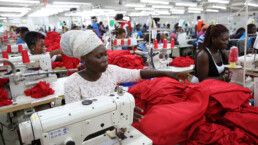Share
Africa is home to 33 out of the 47 Least Developed Countries (LDCs) in the world today. This means seventy percent of countries with a Gross National Income per capita of USD 1,018 or less are located on the continent. LDCs face critical structural impediments to sustainable development, are vulnerable to economic and environmental shocks, and suffer from low levels of human assets.
Industrial policy remains a viable pathway through which LDCs can restructure their economies and accelerate progress towards growth, job creation, and poverty reduction. The following policy recommendations are based on initial findings from an ongoing study of the State of Industrial Policy in LDCs by the UN Conference on Trade and Development (UNCTAD). African governments could leverage these ideas toward driving industrial growth in the coming years.
Take more risk: back winners boldly
One of the strongest arguments against industrial policy and government intervention in markets is that governments cannot reliably predict which firms or sectors within the economy will do well. Based on this argument, the World Bank, among other institutions, has advised against the ‘developmental state’ approach to industrialization. It rather suggests that governments focus on creating an enabling business environment by providing proper infrastructure, curbing corruption, and addressing regulatory and institutional bottlenecks to growth. The rationale is that, once an enabling environment is created, competitive markets will naturally foster growth in the right sectors with positive spillovers into the rest of the economy.
This is not bad advice. However, the notion that governments cannot ‘select winners’ is not always true. In fact, governments inadvertently pick winners everyday through the decisions they make about budgets, financial sector reforms, infrastructure, institutions, etc. What 21st century Africa needs is not less intentionality about where we invest our limited and dwindling resources. Governments must indeed create better investment climates, but they must also be attentive enough to identify the sectors, subsectors or firms that do better than others, and bold enough to back them by removing specific constraints to their growth – even at the expense of failing sectors.
Ethiopia has followed this approach with the transportation and horticulture sectors, and is currently enjoying an enviable payoff in GDP growth terms. This more deliberate approach is not risk-free. It is possible to give up on a struggling sector prematurely, or to invest in a promising sector that ultimately underperforms. Formal consultations with private sector representatives, and full transparency about the data driving investment decisions, could mitigate frictions that arise in this process and galvanize sustained support even for governments that make mistakes. Given that industry-led structural transformation requires shifting limited resources from low-productivity to high-productivity sectors, intentionality will serve Africa well, and is a risk worth taking.
Create private-sector-inclusive horizontal coordination bodies to promote Science, Technology and Innovation
Global value chains (GVCs) are experiencing a shift in the locus of value because service-based tasks such as product concept design, R&D, marketing, and sales have become more important and lucrative than actual manufacturing. With this growing servicification of GVCs, countries must pursue Science, Technology, and Innovation (STI) policies that position citizens to remain prosperous in the global economy.
A study across several African countries including Chad, Sudan, and Senegal reveals that a key problem with STI policy is the fragmentation of implementation across many government ministries and research institutions. In Senegal for example, the Institut de Technologie Alimentaire is attached to the Ministry of Industry, while the Institut Sénégalais de Recherche Agricole and the Institut National de Pédologie are attached to the Ministry of Agriculture – although all three of these institutions work on food and agriculture research. Similarly, in Sudan, STI policy is spread across the Ministries of ICT, Higher Education and Scientific Research, Industry, and Agriculture and Livestock.
It may be unrealistic to push for an amalgamation of these bodies in the short term. However, governments must create coordination bodies to streamline strategies across these institutions in order to build bridges that accelerate progress towards fostering services-intensive economies. Better coordination is also critical for activities such as procurement because demand pooling strengthens bargaining power and reduces waste in expenditure, thus freeing up resources for investment in other aspects of STI policy implementation.
It is important to ensure private sector participation in the governance of these coordination bodies. A hybrid approach to governance would allow private and public sector actors to combine their unique skills and experiences toward ensuring that STI policy is inclusive, comprehensive, and agile enough to meet countries’ needs.
Revamp FDI flows by targeting ESG finance
In June 2020, UNCTAD predicted a 15% drop in FDI flows into Africa, driven by the double blow of the coronavirus and low commodity prices, as well as donor fatigue. On the other hand, there is a growing number of socially conscious investors who are using Environmental, Social, and Governance (ESG) criteria to screen potential public and private investments. In Europe, ESG funds are forecasted to outnumber conventional funds by 2025. Given that the relative size of the sustainable investment market in Sub-Saharan Africa already ranks ahead of major markets such as the United States and Brazil, there is reason to believe the trend in Europe will soon repeat itself in Africa.
Africa’s industrialization stakeholders must proactively begin to tilt their preferences towards ESG finance because it presents a novel opportunity to revamp the slump in FDI flows while compelling governments and firms to address key environmental and social concerns hampering the continent’s investment climate. In doing so, Africa could take the lead in modeling what it means to build sustainability into the process of creating an industrial economy, and relaunch a virtuous cycle of growth and increased capital inflow.
Nearly half of the countries in Africa will hold some type of election this year. By adopting these and similar ideas, the leaders at the forefront of our emergence from the global pandemic can refine current industrial policy into coherent, sustainable, forward-thinking strategies that truly give Africans a shot at prosperity over the next few decades.
The views expressed in this article are those of the author and do not necessarily reflect the views of Future Africa Forum. Future Africa Forum is a pan-African policy think-tank and policy advisory consultancy headquartered in Nairobi, Kenya.



